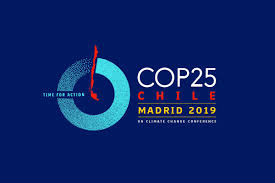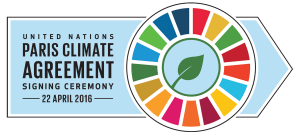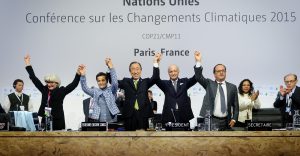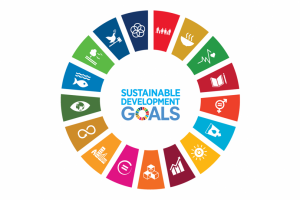
Now I’m not in New York City; at least not at the moment. And I am not particularly plugged in to UN sources or other related IOs. However, it seems to me as though the SDGs – following two very publicized UN Summits, the SDG Summit in September 2023 and the Summit of the Future (SoTF) in September 2024 – have both ‘dropped like rocks’ into the international deep. Silence now seems to dominate both their efforts.
Now, before I look a little more closely at the evidence, it is worth noting, rather gloomily I must admit, the recent raft of summit gatherings including: COP29 on climate from Baku Azerbaijan, COP16 the Biodiversity Conference from Cali, Colombia and the Plastics Conference in Busan, South Korea.
At the annual climate change conference, this year COP29 in Baku Azerbaijan, a petrostate even, there was unsatisfactory progress as the global average temperature continues to rise. As noted in the NYTimes:
Negotiators at this year’s United Nations climate summit struck an agreement early on Sunday in Baku, Azerbaijan, to triple the flow of money to help developing countries adopt cleaner energy and cope with the effects of climate change. Under the deal, wealthy nations pledged to reach $300 billion per year in support by 2035, up from a current target of $100 billion.
Independent experts, however, have placed the needs of developing countries much higher, at $1.3 trillion per year. That is the amount they say must be invested in the energy transitions of lower-income countries, in addition to what those countries already spend, to keep the planet’s average temperature rise under 1.5 degrees Celsius. Beyond that threshold, scientists say, global warming will become more dangerous and harder to reverse.
And with respect to the urgency to move away from fossil fuels, well:
The agreement on finance ultimately affirmed a commitment to last year’s consensus on transitioning away from fossil fuels. But delegates rejected a separate document that, in theory, focused on the transition away from fossil fuels, but that after many rounds of editing ended up not even mentioning them.
And with respect to the Biodiversity Conference COP 16, held this year in Colombia:
The COP16 biodiversity summit came to an abrupt halt after countries failed to reach consensus on the creation of a new fund during a mammoth 10-hour final plenary session.
Countries debated through the night on Friday in Cali, Colombia, in an attempt to get through the many items on COP16’s agenda.
But, as the talks dragged on into Saturday morning, a large number of developing-country delegates were forced to catch flights home, leaving parties without the “quorum” needed to reach consensus on key issues.
Finally, with respect to the Busan, Korea meeting on plastics, here reporting from the Washington Post:
Negotiations in Busan, South Korea, to finalize a global treaty on plastic pollution collapsed earlier today, as oil-rich nations pushed back on a plan by more than 100 countries to include measures that would reduce plastic production, arguing the treaty should focus only on pollution. The talks were the last of a scheduled five, but negotiators are pushing to add another round and adopt a ‘Chair’s Text’ as the basis for 2025 negotiations.
The breakdown came after a week of late-night negotiations involving hundreds of diplomats as plastic industry officials and environmentalists watched from the sidelines in the hallways of the Busan Exhibition and Convention Center. The outcome underscores the difficulties in dialing back the use of a material that is ubiquitous and underpins a global multibillion dollar industry.
Now let’s return to the SDGs. I wrote in September 2024, in an Alan’s Newsletter Substack Post, just before the SoTF:
There will be serious efforts at the UN meetings to urge all to focus on the SDGs and accelerate efforts to achieve these goals. But there is a huge problem – a serious disconnect. And it spells continuing problems for collective global governance efforts. There is an unfortunate glaring disconnect here. The urging is [coming from] the multilateral level but the implementation is at the national level. And efforts at the national level are either underwhelming or, sadly, non-existent. Multilateralism is built and moves forward at the national level and as I have pointed out before, key member states, read that the United States – are disengaged from any national effort. US executive and congressional budgeting processes and finance and development policy implementation are simply void of any SDG policy efforts. And the US is not the only member state in this situation. The rhetoric may be there at the international level but today it does not link to national policy action.
At that time in that Post I said I’d return to the SDGs and so here we are.
In looking back, it seems that coming out of the pandemic there appeared to be some signs of encouragement that the SDGs were ‘on the move’. My good colleague, Homi Kharas from Brookings who has played a valuable role in focusing on the SDG efforts including helping to launch the SDGs by advising the U.N. Secretary General on the post-2015 development agenda (2012-2013) and leading the Report that was presented on May 30, 2013, “A New Global Partnership: Eradicate Poverty and Transform Economies through Sustainable Development” wrote in early 2022:
Entering 2022, then, the prospects for improved financial, scientific, and institutional backing for public health—while not sufficient—are grounds for optimism.
Homi further suggested that there was, as he described, an “under the radar story about wider awareness of the SDGs:
… but the upswell in awareness of the SDGs is palpable and significant. Awareness builds change, and change builds greater awareness and learning. A positive cycle is established.
One consequence of this growing awareness, according to Homi was the following:
It is early days, but sustainable and green finance are entering the mainstream with the prospects of more growth, standardization, and attention to avoiding greenwashing in 2022.
Even more pointedly, Homi suggested that a vein of optimism was called for. The reason: technology could provide the necessary fillip to efforts to achieve the SDGs. Under the header, “ Technology is finally delivering on its promise to make major economic production and consumption structures more sustainable”, Homi provided this example of the significant role of technology in achieving the SDGs :
There is now evidence to support the idea that when technology and economics provide the right conditions, countries can overperform on their climate pledges by a large margin. As one example, India pledged, in 2015, to generate 40 percent of its electricity in 2030 using nonfossil fuels. It reached that target last year, nine years ahead of schedule.
The technology initiatives that Homi pointed to have no doubt been helpful for economic growth but it seems to me that technology has not provided the widespread impact that at least was hinted at by Homi and described in the book that he and John McArthur and Izumi Ohno published at Brookings in 2022: The Promise of Frontier Technologies for Sustainable Development.
Nor have other optimistic signs that Homi and his colleagues pointed to in 2022. Besides greater awareness of the SDGs, and the impact of technology and better global public health there is also a more favorable outlook for world population. Still, the more recent assessment by Homi and his colleague John McArthur in a Brookings piece titled, “How is the world really doing on the SDGs?”, published this November, fairly assesses, sadly, I think, the global ‘state of play’:
Even if the pace of progress is not sufficient to achieve what 193 countries committed to delivering, this does not mean everything is getting worse. Our study examined 24 SDG-relevant, country-level indicators and started with a basic question: Have things improved since 2015? We found humanity-wide improvements for 18—ranging from the enlargement of marine protected areas to expanded access to water and sanitation. Such gains do not minimize the pain of backsliding on the six remaining measures, especially those linked to hunger and food security, not to mention the horrendous health and educational consequences of the COVID-19 pandemic. But they do show why we need to differentiate progress toward the SDGs more systematically.
When we investigate which trends have changed since the SDG agreement in 2015, the results are more muted. The clearest accelerations in progress are in HIV incidence, antiretroviral coverage to treat AIDS, and access to electricity.
For eight indicators, however, we found no change in the long-term rate of progress, and spotted signs of a slowdown in nine others. (For four indicators, we did not have sufficient pre-2015 data to assess long-term changes.) The takeaway is that there is no single overall story to tell about the SDGs. Most countries are doing better on some issues and worse on others, suggesting that the world needs a more balanced scorecard for cataloging successes and failures.
If folks were hoping for a broad and systemic effort to achieve the goals set for global development under the SDGs, well that is not where we are though there has been progress on at least a number of goals.
I couldn’t quite leave it there so I decided to ring up my colleague, Homi, to get his most recent view of the world’s advancement through the lens of the SDGs. Homi did note of course that on several goals, those mentioned in his recent Brookings pieces, the efforts of states have bent the curve on those goals. But he also admitted that the case that has been made for a comprehensive approach with speed and urgency, that has been called for by the UN and particularly by the Secretary General of the UN, António Guterres, that case isn’t being heard globally. Given the rising geopolitical tensions and the series of regional conflicts, the collaborative underpinnings identified, and in fact needed by the SDGs and the collective efforts targeted by Agenda 2030, do not match up well with today’s global political interactions. Nevertheless, Homi defended the ‘plan’ as set out by Agenda 2030 suggesting that Agenda 2030 was the only plan, the sole common language framing global development today. He even suggested that come a future crisis, whether in nature, climate change, debt distress, climate finance, whatever, the SDG framework will be there and available to be taken up at that moment to meet that crisis.
Looking to the near future Homi suggested that renewal or reshaping of the SDGs are likely to be taken up in 2027 and shift into high gear likely will begin by 2028. Is renewal a realistic possibility, yes? But the shadow of President Trump and his second term cannot be ignored either. Such Trump concern could extend to the UN, itself, with the real prospect of a growing unwillingness on the part of a Trump administration to work with the UN, possibly even withdraw, or Trump 2.0 might be unwilling to pay its UN dues or arrears. And that would be a crisis.
But that’s for a separate examination. Meanwhile, there is advancement towards selected goals but overall, the current bottom line is described by Homi and another colleague, Zia Khan, the Chief Innovation Officer for Innovation at The Rockefeller Foundation in an August piece at Brookings titled: “Rebooting the Sustainable Development Goals” :
With six years remaining until the 2030 deadline, the world is far from achieving most of these goals. Despite significant improvements in some areas – such as a million more children reaching their fifth birthday each year – progress has been too slow in many others.
While financing gaps are rightly often cited as a key factor, the biggest obstacle to achieving the SDGs is the lack of systematic approaches to creating scalable solutions. Slow and steady gains can lead to significant advances over time, but if progress becomes too slow, the sense of achievement and hope for the future can dissipate.
In 2015, the SDGs were launched with a call for transformation. But calling for transformative solutions is easier than developing them. Although markets are powerful drivers of innovation, we need solutions capable of tackling broader public interests. Progress often requires new forms of collaboration between public, private, scientific, and civil-society institutions, or even the creation of new ones. But many organizations have difficulties updating their goals or building partnership strategies.
Siloed professional communities are difficult to unite, leaving vested interests and the forces of inertia to crowd out innovation. Consequently, partnership remains more an aspirational value than a skills-based discipline, and policy debates often prioritize ideology over practical solutions.
So individual goal progress but no overall advancement at achieving the SDGs. The world is, of course, worse for it. Besides a renaissance in US thinking on the SDGs are there alternative pathways? Maybe. The China-West Dialogue (CWD) has been exploring the possible role of Middle Powers in the near future and their capacity to move global order issues forward without the leading or even the major powers. Devising collective actions among groups of the Middle Powers might advance collective efforts and move towards the goals of the SDGs.
But more on that later.
This Post first appeared as a Substack Post from Alan’s Newsletter.
https://globalsummitryproject.substack.com/p/focusing-on-the-future-where-are
Image Credit: Jane Goodall

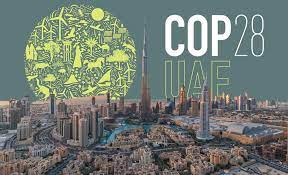
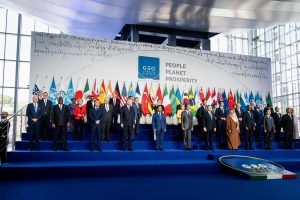

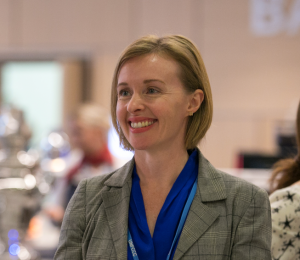 The ‘Environmental Story’ doesn’t seem at the moment to have a happy middle or end. But it is hard not to be drawn to the drama that is the global effort to reduce CO2 emissions.
The ‘Environmental Story’ doesn’t seem at the moment to have a happy middle or end. But it is hard not to be drawn to the drama that is the global effort to reduce CO2 emissions.